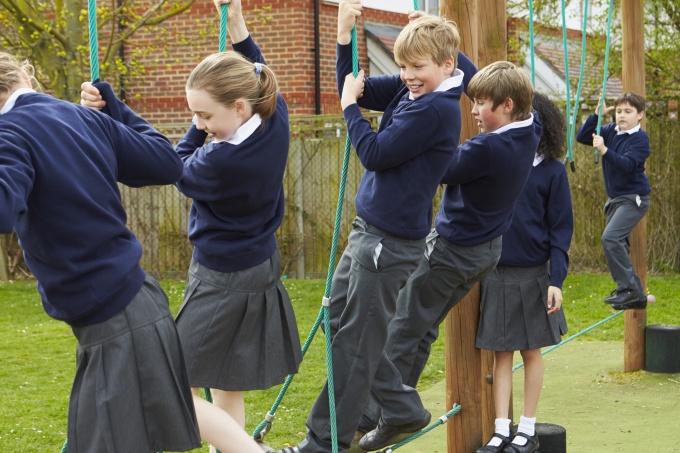About our school
Holy Trinity and St John’s CoE Primary School is based in Margate, in Kent, and has 408 pupils. It has high levels of deprivation with generational poverty and a high degree of social and emotional needs. As a result, a high proportion of its pupils have experienced significant interruptions in their lives. The Kent average for pupils who have or have had a social worker is three children in every class. At Holy Trinity and St John’s CoE Primary School, it is six children in every class. A total of 84 per cent of its 2021 to 2022 Year 6 cohort had a significant safeguarding file. And 80 per cent of its 2022 to 2023 cohort have or have had support from our Family Support Team.
How our Thrive journey began
“We chose Thrive because it was something that resonated for our whole school community. We’re in a deprived area with families from a range of backgrounds and the idea of a relational approach was something that felt right. The principle of interruptions contained in the Thrive Approach and the way that when a child struggles it relates to their emotional age was something that really opened my eyes. Thrive made sense to us and it’s what our children need,” said Headteacher Rob Garratt.
The school’s Thrive journey began three years ago when Assistant Headteacher and Senco, Donna McGiurk, joined and it gained further momentum in September 2022 when Head of School and Inclusion Lead Sarah Roberts was appointed. Since then, Rob, Sarah and Donna as well as the Assistant Headteachers have completed Thrive’s Leading Emotional Healthy Settings training in order to gain a strategic overview of how the Thrive Approach to mental health and wellbeing should be implemented in a school.
“Attending the LEH course cemented my understanding of how to develop the Thrive Approach and principles across our school. The trainer (Sarah Norwood) was fantastic at delivering the content and facilitating open, safe and supported conversations around what the different developmental stages look like and how to respond and how to support our pupils and their parents with their emotional regulation. I was able to take back my learning from each session and discuss with my senior leaders about how we will develop further our relational approach across the school,” said Rob.
“Having this more in depth understanding has allowed me to discuss, in more detail, actions and plans with our Thrive Licensed Practitioners and our wider staff - especially when we are discussing individuals or groups of pupils who need support with their emotional regulation. I have also been able to do this with confidence with our parents when discussing their child's emotional needs.... I highly-recommend leadership teams attend this training,” said Rob.
“The fact that Thrive was based on brain development and neuroscience made it something that felt robust and research-based,” said Sarah.
A relational approach
There are currently two Thrive Licensed Practitioners and Thrive has transformed how the setting approaches supporting pupils with social and emotional needs. The setting has developed its behaviour policy into a relational approach to behaviour policy based on Thrive and all staff are being trained in this new approach.
Initially, the school focused on one-to-one and group Thrive work but, more recently, assessments have been done for the whole school, giving staff visibility of which children need interventions or additional support. It is now developing its Thrive spaces and has six Thrive rooms including two new cabins that will be ready this term. Every classroom has a Thrive trolley full of Thrive materials to support teaching and learning.
Consistency has been key to the Thrive rollout and everyone has been given training to ensure a commonality of approach and language. This is also starting to move out into the school community with the completion of its first Family Thrive course, with plans to run additional courses later this year. Teachers have shared Thrive plans with parents and carers, where appropriate, over the summer, something that has generated positive feedback from families.
“We’ve had parents in Family Thrive sessions realising that they’ve got developmental interruptions themselves and the course has really helped them to think about how they are with their children and to understand why their children are behaving in a certain way,” said Sarah.
The impact: fewer behavioural problems and children who are ready to learn
The school’s latest Ofsted inspection, in March 2023, praised the school’s approach to learning and behaviour, highlighting how effectively it supports pupils’ wellbeing.
“Leaders create a calm and purposeful approach to learning. They have recently reviewed their approach to how staff support pupils’ behaviour. This has made a positive impact on the culture in the school. Strong systems support pupils’ emotional well-being effectively. This helps pupils to learn how to manage their feelings and to remain focused in lessons. When pupils’ behaviour is more challenging, staff respond in a clear and consistent manner,” said the report.
As a result of implementing Thrive, the school is seeing fewer behavioural incidents and calmer, less disruptive classrooms. Children who were previously at risk of exclusion due to the level of their dysregulation are now able to be in the classroom, actively taking part in lessons.
“Our children weren’t ready to learn and now we have a tool to help them regulate themselves so that they are ready. We have seen dramatic improvements from children who were previously not able to access the classroom. And if one disruptive child is no longer being disruptive then it’s not just that child that benefits – all of the children in the class benefit,” said Sarah.
For one group of Reception children who were struggling to remain emotionally-regulated in class, teachers took them out of their usual classroom and into the Thrive room where Thrive Licensed Practitioners could work with them to help them regulate themselves. As a result, one child went from seven behavioural incidents in a term to one. Another child went from six incidents to two and a third went from five incidents to two.
“We saw a dramatic decrease in the number of times they were becoming dysregulated,” said Sarah.
“There are big benefits to children of being able to regulate themselves. The number of emotional discharges where tables and chairs go over have reduced. Children now take themselves to a safe space where they can regulate so the children around them are safer. Our children are able to verbalise how they feel and we can see clear evidence of the impact of Thrive - there is a positive atmosphere around school,” added Rob.
‘Staff feel better-supported and more confident’
This positive atmosphere has also had an impact on staff who now have the tools to understand why a child may be behaving the way they are. Educators have been encouraged to respond to children in a consistent and relational manner. For example, if they spot a child in the corridor, asking them ‘how can I help you?’ rather than ‘what are you doing here?’ As a result, staff now feel better-equipped to deal with behavioural incidents and to support pupils' wellbeing.
“Staff feel more confident. They know they are supported because we have a structured, whole school approach – it's a positive shift for everyone,” said Rob.
Next steps for the school include working towards Thrive’s Ambassador Awards programme and, hopefully, playing an even greater role in the community, with the goal of setting up a wellbeing hub that could house a food bank and resources for the community.
“We’re on a journey and we’re doing it together - it's something staff, pupils and families are all working on because we can only do so much in school,” added Rob.
Over to you
Click here to schedule a Discovery Call with your regional expert to find out how Thrive could help your setting manage behaviour and support staff. Designed to fit in around your schedule, these free 30-minute conversations via Teams give you a chance to have your questions answered and decide if our service is a fit for your needs.

_680.jpg)

(7)_680.jpg)
_680.jpg)
